 What are the connections between education and political behaviour? Paula Surridge explains why there may be something specific about the experience of higher education which produces more liberal values, regardless of the subject of study. She writes that a fruitful line of enquiry for political scientists will be to seek a deeper understanding of the connections between education and values.
What are the connections between education and political behaviour? Paula Surridge explains why there may be something specific about the experience of higher education which produces more liberal values, regardless of the subject of study. She writes that a fruitful line of enquiry for political scientists will be to seek a deeper understanding of the connections between education and values.
The proportion of the electorate with a degree level qualification has almost quadrupled over the last 30 years. In 2017, around one in four members of the electorate had a degree; with a recent report estimating that the proportion of young people going into higher education in England has all but reached one in two. Yet prior to the EU referendum very little attention had been paid to what this might mean for political values and political behaviour.
Immediately after the referendum, the narratives focussed on the ‘left behind’ drawing on aggregate level data to demonstrate a correlation between Leave-voting areas and areas experiencing economic hardship. However, data at the individual level has repeatedly shown that having a degree level qualification is the strongest predictor of a Remain vote. Whilst, it is also the case that those with degrees are, on average, younger than those without, as Figure 1 shows this ‘education gradient’ in the likelihood of voting Leave persists within generational groups.
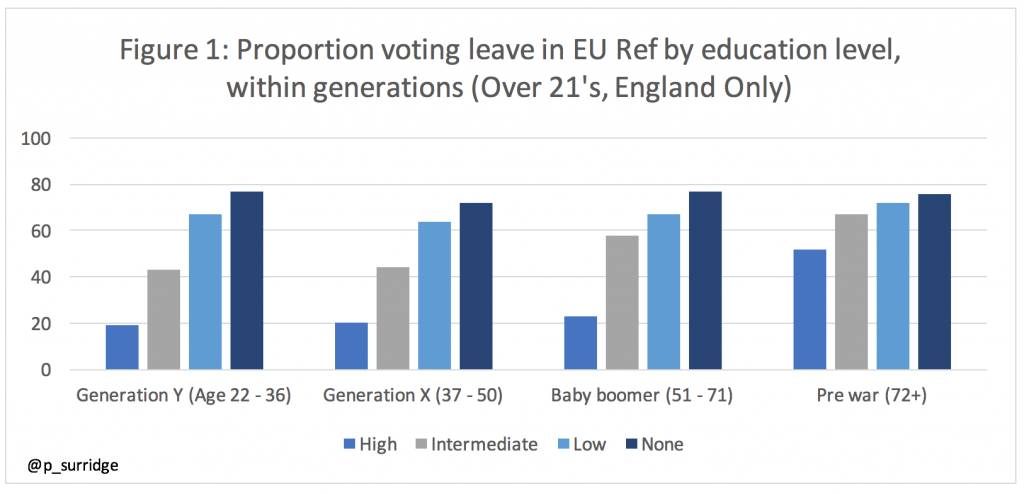 Source: British Social Attitudes, 2016 Note: Small N’s (< 40) for Gen Y/None and Pre-War Degree combinations
Source: British Social Attitudes, 2016 Note: Small N’s (< 40) for Gen Y/None and Pre-War Degree combinations
The effects of education on voting behaviour at general elections has received very little attention, with commentators focussing on the decline of class voting, rise of age-based differentiation, and other new divides. Much of the effects of education on voting are masked by focusing only on the two ‘main’ parties but there are important differences when we look at ‘other’ parties; particularly the rise (and fall) of first the Liberal Democrats and over the last (short) electoral cycle UKIP.
The two ‘other’ parties of English politics have clear patterns of support with education level. UKIP’s support was concentrated among those with education levels below degree level, gaining 16% of the votes of this group in 2015. The Liberal Democrats, in contrast, have historically been better at securing the votes of the degree-educated section of the electorate. In 2010, the party secured one in three votes among this group and were the most popular choice of party for voters in this group.
The rise and fall of these parties since 2010 has reshaped the relationship between education and voting behaviour for the ‘main’ parties. Prior to 2015, when the LibDem vote was high, the Labour party attracted a greater share of the vote among those without degrees. Between 2010 and 2015 the Labour share of the vote among the degree educated rose while its share of those without degrees fell. A result was the move of (some of the) ‘not degree’ group to UKIP while the degree educated deserted the Liberal Democrats after the formation of the coalition government. It is important to stress this happened while Ed Miliband was Labour party leader and before the EU Referendum – this is neither a Corbyn nor a Brexit effect.
These patterns are also reflected in the changing vote shares of the Conservatives. While their share of the vote has been higher among those without degrees since at least 2005, in 2017 the gap between the two groups in their propensity to vote Conservative markedly widened.
What then links education level to political behaviour? The answer lies in the relationship between political values and voting behaviour. While the traditional ‘left-right’ value dimension which focuses on economic justice and power barely distinguishes Leave and Remain voters, there are much larger differences according to ‘cultural’ values which relate to issues of authority, tolerance, and the rule of law.
It has long been established that those who have experienced higher education are more liberal than those who have not on this ‘cultural’ dimension. Exactly how ‘education liberalises’ remains the subject of some debate. Evidence from Switzerland has suggested it is primarily a self-selection effect of those going to university being already more liberal than those who do not; while there is an on-going suggestion that it is the beliefs and values of academic staff which produce more liberal graduates. To fully explore these propositions, good quality longitudinal data are needed. In the UK, the 1970 birth cohort study provides one such source (albeit one frozen in time before more recent expansions of the higher education sector).
Taking attitudes to the death penalty as emblematic of these ‘liberal’ social/cultural values it is possible to track how these change before and after higher education. As Figure 6 shows, it is the case that those who went on to gain a university degree were less likely to support the death penalty even before they completed their UCAS forms (at age 16) but this gap widens over time so that by age 30 the gap between those with degrees and those with lower level qualifications has increased. It is also clear from this chart that the key differentiation is between those with degree or higher-level qualifications and those with other qualifications. This suggests that there is something specific about the experience of higher education which produces more liberal values. This appears to be something which is independent of the subject of study as a similar increase in the proportion not in favour of the death penalty occurs across different subject groups.
When seeking to understand the connections between education and political behaviour, the dominant approach in political science has been to turn to the idea of a social cleavage, but this is difficult to sustain as there is little evidence that education produces the kind of social group identity that is needed to classify a divide as a cleavage, quite apart from the lack of a clear articulation of education-based interests by political elites. A more fruitful line of enquiry is to seek a deeper understanding of the connections between education and values: to understand how education liberalises. To do this adequately will require a much closer examination of the processes, content, and types of educational experiences of those who ultimately end up with different qualification levels. It will require political analysts to take education seriously and not as a ‘black box’ explanation for value divides and voting.
___________
 Paula Surridge is Senior Lecturer in the School of Sociology, Politics and International Studies at the University of Bristol.
Paula Surridge is Senior Lecturer in the School of Sociology, Politics and International Studies at the University of Bristol.
All articles posted on this blog give the views of the author(s), and not the position of LSE British Politics and Policy, nor of the London School of Economics and Political Science. Featured image credit: Pixabay (Public Domain).


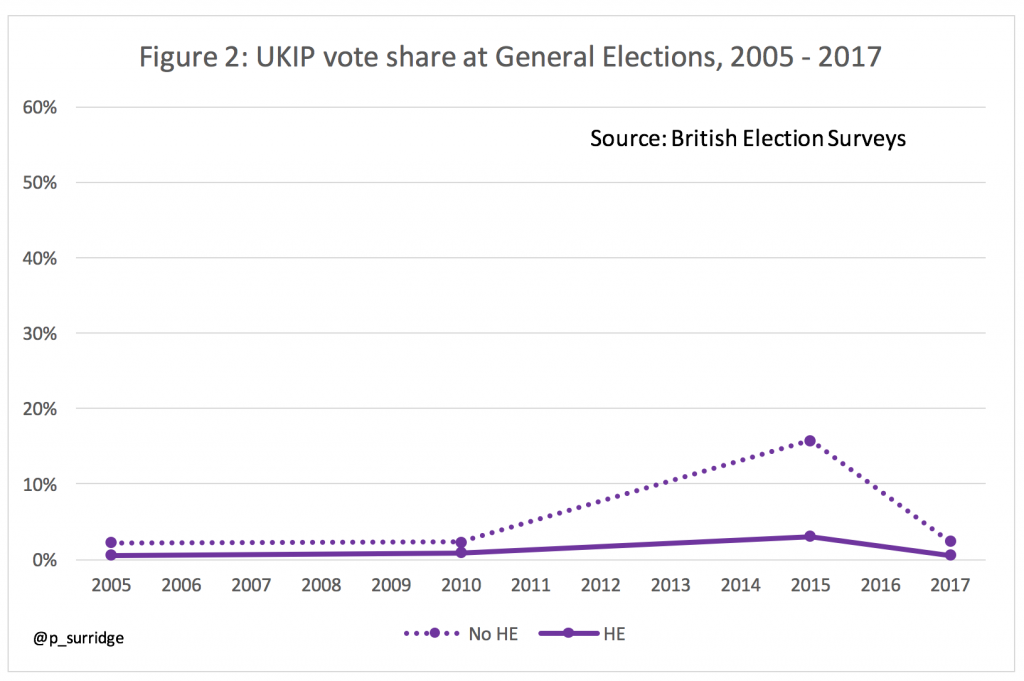
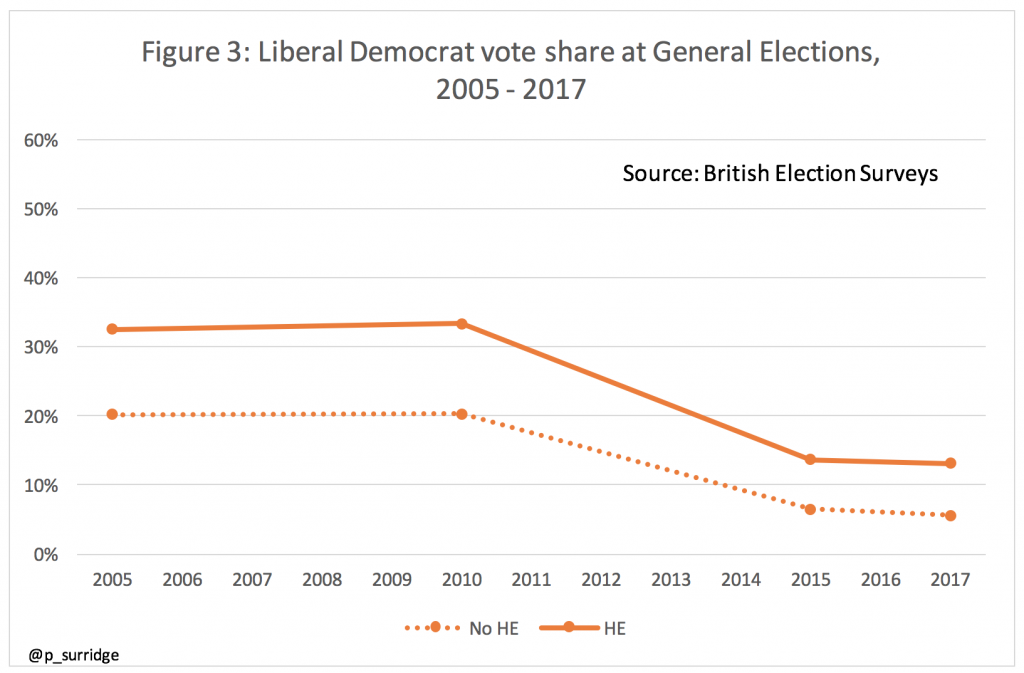
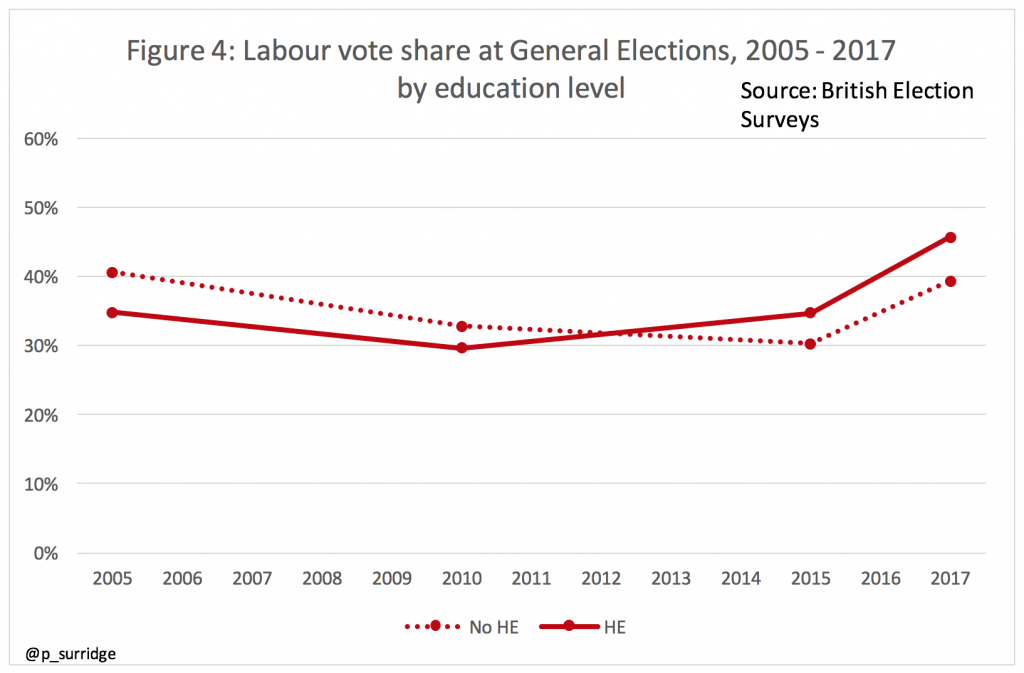
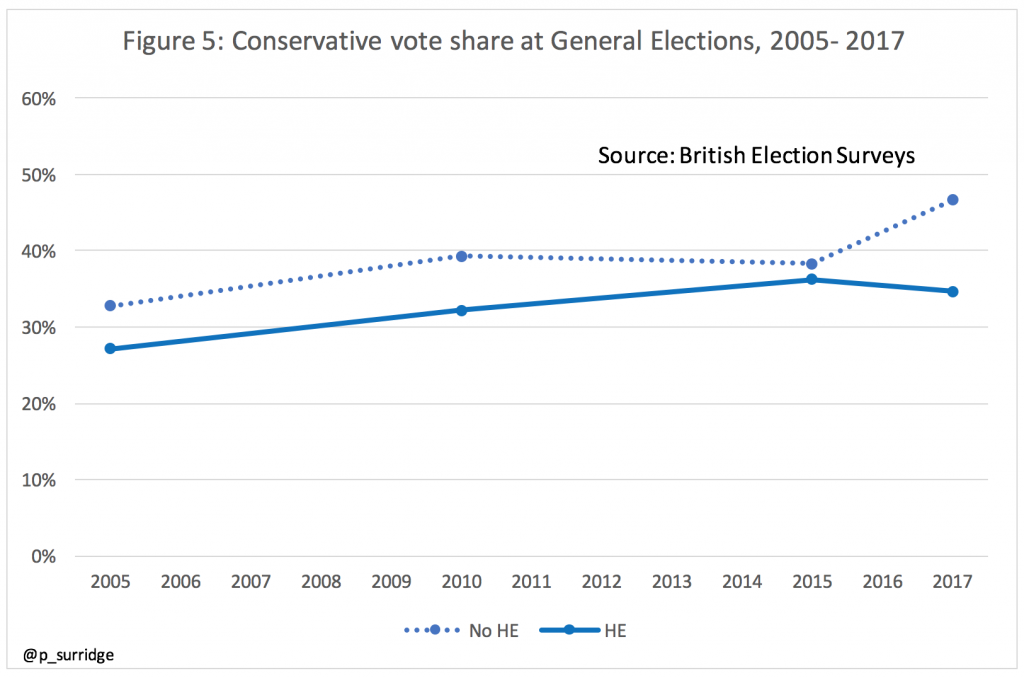
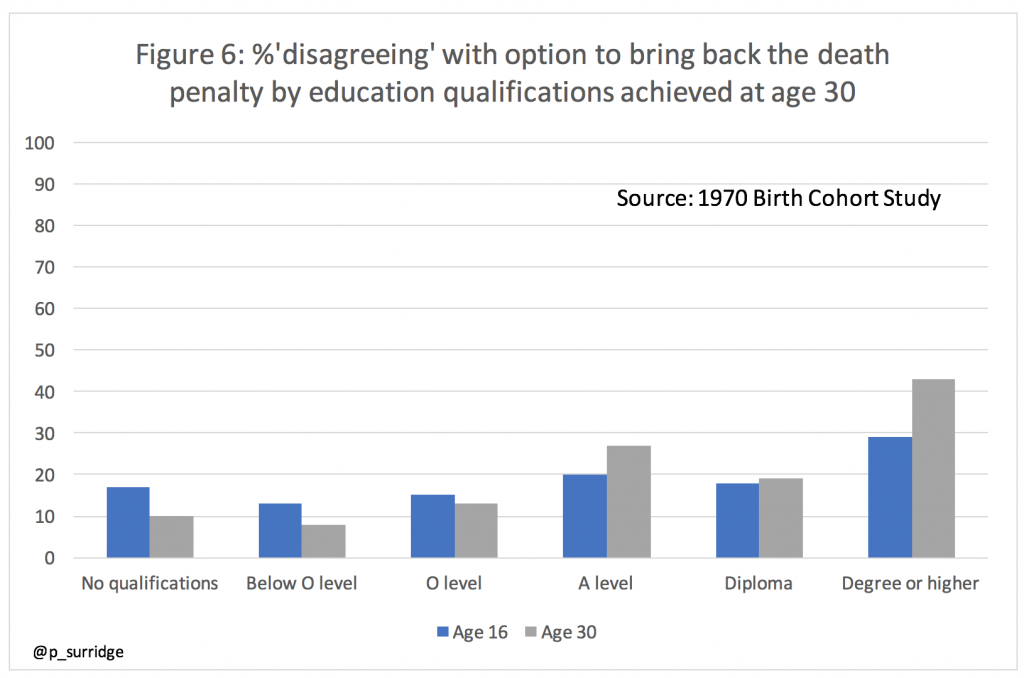




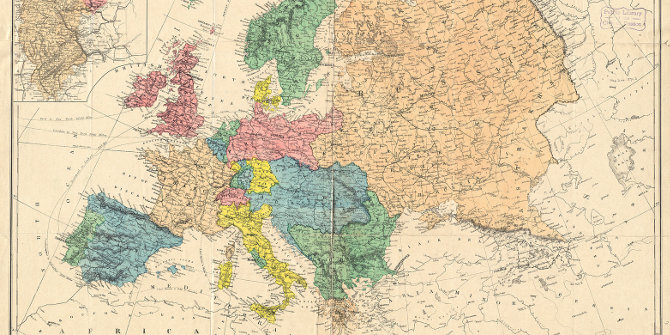

Hi Paula
I think you may have made a mistake in Figure 1. I read the chapter on the “The EU Debate” in British Social Attitudes 2016. I think you got the data from Table 4 and it does not link age and degree in the way you have reported. Perhaps you had access to more detailed data? If so can you direct me to it? I have an interest in the topic.
Best Wishes
Rachel